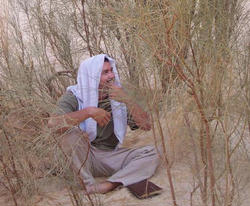
Some think these words describe lying lips, and a false tongue which are like arrows, sharp ones, sent out from a bow drawn with a mighty hand, which come with great force, suddenly and swiftly, and do much mischief see Psalm 11:2 and to "coals of juniper", very distressing and tormenting the tongue being a fire, set on fire of hell, and sets on fire the course of nature and throws out devouring words, which consume like fire, James 3:6. Gill's Exposition of the Entire BibleSharp arrows of the mighty, with coals of juniper. Though, all things considered, it doth thee no good, yet it doth others much hurt, to whom it is like sharp arrows, &c. But according to the other translation, which is in the margin, this is a further declaration of the sin of calumny. And the psalmist may possibly express it in these words, to show, the suitableness of the punishment to the sin as thy tongue shoots arrows, (for so calumnies are called, Psalm 57:4 64:3) and kindles coals, so thou shalt bring God’s arrows and coals kindled by the fire of his wrath upon thyself. shot by the hands of a strong man and to coals, Psalm 140:10, and here toĬoals of juniper, which being kindled burn very fiercely, and retain their heat for a long time. rows, as Psalm 7:13,14, &c, and here to arrows of the mighty, i.e. Matthew Poole's Commentary So this verse contains an answer to the question Psalm 120 3, and declares the slanderer’s recompence which is the wrath and vengeance of the mighty God, which in Scripture, and particularly in this book, is oft compared to at. The cut given below will give an idea of this plant. The shrub sometimes grows so large as to furnish a shade to those exposed to the heat of the sun in the desert, 1 Kings 19:4 "Land and the Book" (Thomson), vol. Burchardt says that he found the Bedouin of Sinai burning the roots into coal, and says that they make the best charcoal, and throw out the most intense heat. See "Robinson's Biblical Researches," vol.

The word refers to a species of broom or shrub growing in the deserts of Arabia, with yellowish flowers and a bitter root. The idea here is, that coals made from that would be intensely hot, and would cause severer pain than if made from other wood.

With coals of juniper - On the word here rendered "juniper," see the notes at Job 30:4. Those arrows were, of course, sharpened to make them piercing, penetrating, more deadly. The "sharp arrows of the mighty" are the arrows of the warrior - as war was conducted mainly by bows and arrows. The consequence - the effect - of such a use of the tongue must be like sharp and piercing arrows, or like intensely burning coals. Barnes' Notes on the BibleSharp arrows of the mighty - This is an answer to the question in Psalm 120:3.


 0 kommentar(er)
0 kommentar(er)
